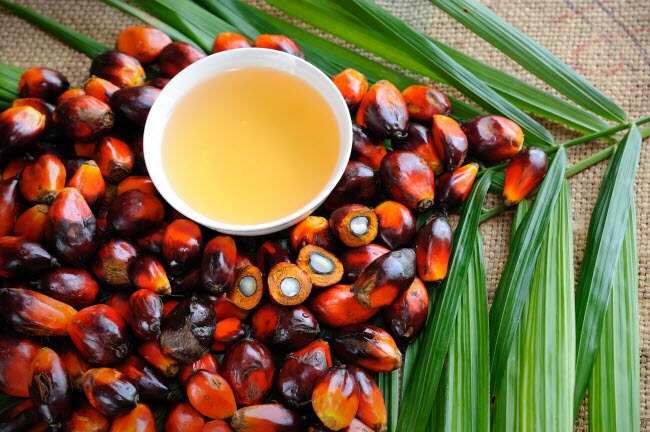You might not realize it, but about half of the items sold in grocery stores contain a commonly used vegetable oil that some researchers warn is endangering the environment.
Palm oil shows up in an array of products that you toss into your supermarket cart, including ice cream, cookies, packaged bread, lipstick, shampoo, soap and detergent, according to the University of Vermont’s Gund Institute for the Environment.
But while palm oil — the world’s most popular vegetable oil — provides a variety of health benefits to consumers, it’s also devastating plants as well as animals, including elephants, orangutans, rhinos and tigers, the Gund Institute says. The institute says that’s happening through the continuing conversion of tropical forests to plantations for production of palm fruit, the source of consumable palm oil.
If you’re looking for the words “palm oil” on the labels of products you’re buying, you’re not likely to see them. Rather, you’ll probably spot the names of palm-oil derivatives such as palmate, palmitate, palmitic acid, palmolein, palm stearine, palmitoyl oxostearamide, palmitoyl tetrapeptide-3, palmityl alcohol, sodium kernelate and sodium lauryl sulfate.
Indonesia, Malaysia and Papua New Guinea account for about 85 percent of production of the world’s palm oil, according to the Rainforest Action Network. In all three countries, plantations of oil palm trees are harming the environment, some activists and researchers say.
“While the benefits of palm oil cannot be ignored, consumers should make a conscious decision as to whether it’s worth potentially destroying entire rainforests for the benefits. Purchasing sustainable palm oil is definitely a good start in the endeavor to reduce your carbon footprint,” says Caleb Backe, a health and wellness expert at Maple Holistics, a New Jersey company that sells cruelty-free, natural, sustainable personal care products.
For their part, promoters of palm oil tout it as a healthy product and insist the environmental claims about it are overblown.
“Much like an urban legend that just won’t go away even after it’s been debunked, some myths about palm oil and the environment should really be put to rest,” the Malaysian Palm Oil Council says.
What follows are answers to three questions you might have about palm oil.
1. Is palm oil bad for the environment? Does it contribute to carbon pollution?
Switching just 1 hectare (almost 2.5 acres) of rainforest to production of oil palm trees equates to a loss of 174 tons of carbon, according to a 2018 study, and most of that carbon enters the air as carbon dioxide.
Put another way, the amount of carbon released when only 1 hectare of rainforest is cleared to grow oil palms is roughly equivalent to the amount of carbon generated when 530 people fly from Geneva, Switzerland, to New York City, the study says.
On the Indonesian island of Borneo, the growing number of plantations of oil palm trees is projected to pump more than 558 million metric tons of carbon dioxide into the atmosphere in 2020, according to research published in 2012. That’s an amount greater than all of Canada’s current fossil fuel emissions.
According to a 2018 survey by the Zoological Society of London, 49 out of 70 of the world’s major producers and traders of palm oil have committed in some way to eliminating deforestation. However, the society adds, without substantive verification procedures in place, the effectiveness of these zero-deforestation pledges is questionable.
The Malaysian Palm Oil Council pushes back against complaints about production of palm oil, saying plantations that grow oil palm trees are environmentally friendly.
“In tropical Malaysia, these oil palm trees produce bountiful quantities of oil-rich fruit for up to 25 years,” the council says. “Because these plantations don’t need to be cleared and replanted annually, such as with corn, canola and soy crops, there is significantly less environmental impact.”
A 1-acre oil palm plantation produces 11 times more oil than soybeans, 10 times more than sunflowers and seven times more than rapeseed (canola), the council says.
2. What should I look for when buying palm oil?
If you’re hunting for products containing sustainable palm oil, search for the Roundtable on Sustainable Palm Oil (RSPO) label, says registered nurse Rebecca Park, founder of natural health website RemediesForMe.com. The RSPO, a nonprofit organization founded in 2004 and backed by the World Wildlife Fund, establishes and enforces global standards for sustainable palm oil. As of October 2018, the RSPO’s certification program covered 19 percent of palm oil produced globally.
“Sustainable palm oil is economically viable, safe and beneficial,” Park says.
The Malaysian council says palm oil is the first vegetable oil in the world to enjoy sustainability certification.
To learn which global companies are regularly buying sustainable palm for manufacturing their products and which ones are falling short, visit palmoilscorecard.panda.org.
3. What are the health benefits of palm oil?
Experts on both sides of the environmental divide agree on one thing — palm oil offers a number of health-friendly attributes. They include:
- A big dose of antioxidants, thanks to the presence of tocotrienols, which are a form of vitamin E. “These tocotrienols are efficient soldiers against cancer and diabetes,” says JR Fletcher, publisher of Nutritiontastic, a provider of nutritional advice and guidance.
- A shot of cholesterol boosters and fighters. The carotenoids in palm oil help raise the levels of HDL, or good, cholesterol and help lower the levels of LDL, or bad, cholesterol. “You can feel good about consuming products with palm oil because its effects on blood cholesterol levels are similar to heart-healthy olive oil,” the Malaysian Palm Oil Council says.
- A safe balance between saturated and unsaturated fats. “As a result, the oil helps to maintain a stable blood pressure and prevent excess stress on heart,” Fletcher says. “Also, it ultimately means a healthy heart and optimal cardiac functionality.”
- An absence of trans fats. “Palm oil is used by the food industry as a natural replacement for unhealthy partially hydrogenated oils,” the Malaysian council says.

